Text
Groundwater use without proper knowledge jeopardizes sustainable water sources in the long term.

The SADC/GMIC project (phase II), co-financed by CIWA program, is advancing transboundary groundwater cooperation and management. Explore the project's impact on sustainable practices.
#water#groundwater#boundary waters#water cooperation#sustainable water management#CIWA#World Bank Group#water resources#sdg6#knowledge sharing
0 notes
Text
“WASH for Peace” - New guidance & tools for the WASH professionals in fragile contexts.
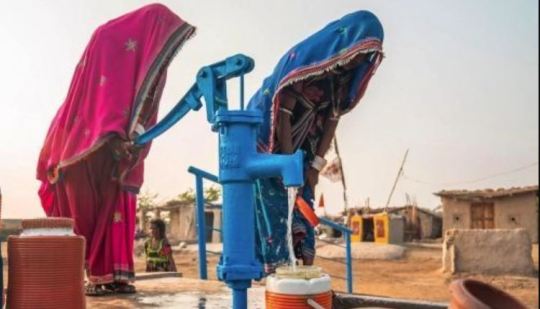
Children in conflict zones are 3x more likely to die from unsafe water and toilets than violence. WASH services can save lives and help bring stability. “WASH for Peace” - new guidance & tools for the WASH professionals in fragile contexts.
#Joint Programme on Water sanitation and hygiene#WASH#water professionals#dian#Guidance & Tools#fragile contexts#zones of war#conflicts zones#water supply#children in conflict zones#unsafe water#unsafe hygiene#unsafe sanitation#Wash for Peace#water for peace#leveraging water for peace
0 notes
Text
Water governance contributes to prosperity and peace by
addressing competition and resolving disputes over water.

Water governance refers to the “ways societies organize themselves to make decisions”, with growing calls to move beyond “water-centric” approaches, taking greater account of the root of the problems to be addressed, and the decisions and actors involved. Growing scarcity, access inequalities, and shocks from outside the water sector have increased inter-dependencies, intensifying competition for water and creating complex economic spillovers. Safeguarding peace and promoting prosperity requires sufficient oversight and investment in
water-related public services, including irrigation systems, drinking water supply, ecosystem conservation, as well as recreational and spiritual values. Water governance must therefore also account for, and ideally influence, decisions in the agricultural, energy, health and infrastructure sectors, as well as the informal sector when it plays a significant role. Equitable governance arrangements, designed to manage complex trade-offs, are required in order to navigate tensions and redress injustices of water supply and allocation. This includes efforts to craft and implement rules for establishing and (re)allocating water rights across competing uses and values and mobilizing the financing required Dating (at least) back to the Dublin Principles of 1992, calls for integrated and cross-sectoral approaches to water allocation and governance are not new. However, integration is costly and contentious, requiring human, social and financial capital beyond the reach of many of even
the wealthiest regions. Local governance plays a particularly critical role when capacity is limited, especially where service provision is decentralized. For example, in parts of West Africa, packaged water distributed by water vendors has become the de facto option in regions lacking municipal water supplies, creating a need for recognition and integration of informal and formal water providers through regional partnerships and diverse governance models that combine public and private roles across scales. As economies diversify from agriculture and resource extraction towards process
manufacturing industries and services, the overall changes in water use have at times been neglected. Agricultural trade has allowed regions to decouple economic development from local water use, as food becomes increasingly imported, but these benefits come with the risk of ‘water grabbing’ in regions where food exports occur without local consent and potential for sacrifice zones of localized groundwater depletion where export-driven agricultural is unsustainable. UNESCO & UN-Water
#investment in#water-related public services#irrigation systems#drinking water supply#Equitable governance arrangements#integrated and cross-sectoral approaches#Growing scarcity#sdg6#water#water sector#informal water providers#formal water providers#overall changes in water#water grabbing#water and peace#water for peace#water for prosperity#unesco#UN-water#World Water Development Report#World Water Assessment Programme#Joint water hygiene and sanitation programme#publication#water access#water accessibility#water conflicts
0 notes
Text
Statement by the Executive Secretary of the Convention on Biological Diversity World Water Day 2024; March 22nd.

Water has the power or create peace or provoke conflict. When there is lack of water, or lack of
access to it, tensions can rise. However, by cooperating and ensuring access to clean water, we can achieve stability. To do that, we need water to be center stage in global planning. Over two billion people are living without safely managed drinking water and roughly half of the world’s population is still experiencing severe water scarcity for at least part of the year. Our water supply depends on water-related ecosystems, whose functioning depends on biodiversity. These ecosystems also regulate climate, reduce impacts of natural hazards, and provide habitats for fish species that feed hundreds of millions of people worldwide.
The Kunming-Montreal Global Biodiversity Framework, or the Biodiversity Plan, sets out the urgent actions needed to halt and reverse biodiversity loss by 2030. Its four goals aim to Protect &
Restore Nature, to Prosper with Nature, to Share Benefits Fairly and to Invest & Collaborate for Nature. Each of the Plan’s 23 targets are relevant to water. Some aim to protect and restore critical habitats,
reduce pollution, and minimize the impacts of invasive alien species, others ensure areas under agriculture, aquaculture, fisheries, and forestry are managed sustainably. Other targets call for the
values of biodiversity – including water-related values – to be integrated into policies across all government ministries, economic sectors, and all facets of society. These actions must be taken
through a gender-responsive approach, while also ensuring the full and effective participation of indigenous peoples and local communities.
The 16th meeting of the Conference of the Parties to the Convention on Biological Diversity will convene in Cali, Colombia in October 2024 under the theme “Peace with nature”. It is time to make peace among people and peace with the planet. This World Water Day, let us work together to promote water for peace and peace with nature.
Statement by Mr. David Cooper; Acting Executive Secretary of the Convention on Biological Diversity World Water Day 2024; March 22nd.
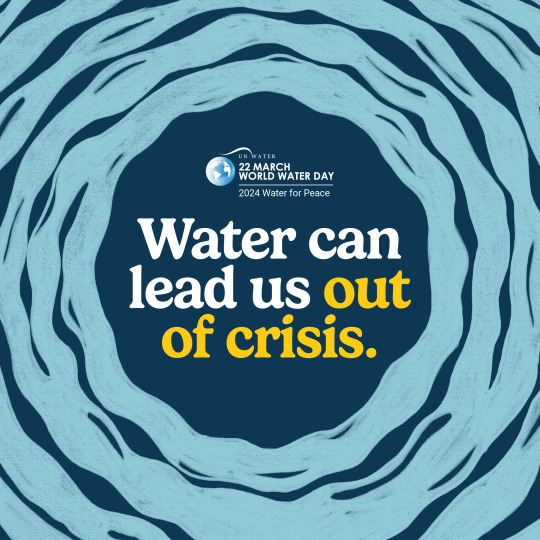
World Water Day is an annual United Nations Observance – held on 22 March – focusing on the importance of freshwater, coordinated by UN-Water and led by one or more UN-Water Members and Partners with a related mandate. The World Water Day celebrates water and inspires action to tackle the global water crisis. A core focus of World Water Day is to support the achievement of Sustainable Development Goal (SDG) 6: water and sanitation for all by 2030.
Key messages for World Water Day 2024
Water can create peace or spark conflict. When water is scarce or polluted, or when people struggle for access, tensions can rise. By cooperating on water, we can balance everyone’s water needs and help stabilize the world.
Prosperity and peace rely on water. As nations manage climate change, mass migration and political unrest, they must put water cooperation at the heart of their plans.
Water can lead us out of crisis. We can foster harmony between communities and countries by uniting around the fair and sustainable use of water – from United Nations conventions at the international level, to actions at the local level.
Read the statement by David Cooper, Acting Executive Secretary of the Convention on Biological Diversity:
"Water has the power or create peace or provoke conflict. When there is lack of water, or lack of access to it, tensions can rise. However, by cooperating and ensuring access to clean water, we can achieve stability. To do that, we need water to be center stage in global planning.
Over two billion people are living without safely managed drinking water and roughly half of the world’s population is still experiencing severe water scarcity for at least part of the year.
Our water supply depends on water-related ecosystems, whose functioning depends on biodiversity. These ecosystems also regulate climate, reduce impacts of natural hazards, and provide habitats for fish species that feed hundreds of millions of people worldwide.
The Kunming-Montreal Global Biodiversity Framework, or the Biodiversity Plan, sets out the urgent actions needed to halt and reverse biodiversity loss by 2030. Its four goals aim to Protect & Restore Nature, to Prosper with Nature, to Share Benefits Fairly and to Invest & Collaborate for Nature.
Each of the Plan’s 23 targets are relevant to water. Some aim to protect and restore critical habitats, reduce pollution, and minimize the impacts of invasive alien species, others ensure areas under agriculture, aquaculture, fisheries, and forestry are managed sustainably. Other targets call for the values of biodiversity – including water-related values – to be integrated into policies across all government ministries, economic sectors, and all facets of society. These actions must be taken through a gender-responsive approach, while also ensuring the full and effective participation of indigenous peoples and local communities.
The 16th meeting of the Conference of the Parties to the Convention on Biological Diversity will convene in Cali, Colombia in October 2024 under the theme “Peace with nature”. It is time to make peace among people and peace with the planet.
This World Water Day, let us work together to promote water for peace and peace with nature."
View Full Statement (PDF)
More Information:
Marine and Coastal Biodiversity
Inland Waters Biodiversity
The Biodiversity Plan
#world water day#water resources#22 march#convention on biological diversity#tackle the global water crisis#leveraging water for peace#statements#water for peace
0 notes
Text
Stand up for clean water!
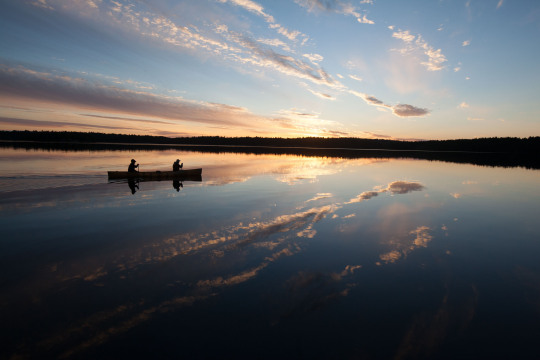
The pressures of rising population, agricultural, and energy demands, and the growing effects of climate change all have a major impact on rivers and water resources.
The theme for this year’s World Water Day global observance on March 22nd is “Water for Peace.”.
#sign the petition#world water day#water#22 march#boundary waters#water resources#effects of climate change#clean water
0 notes
Text
Peacebuilding through Dam Removal.
The theme for this year’s World Water Day global observance on March 22nd is “Water for Peace.” That plea seems apt. Around the world, we see ample evidence that water scarcity creates and prolongs conflict, while cooperative and equitable approaches to water management can foster peace – building prosperity and resilience for all.

The Open Rivers Fund, a multi-year program focused on restoring rivers for people and wildlife across the American West, works with communities to remove outdated and decaying dams and modernize water infrastructure. This work not only restores critical ecosystems, but often results in real economic, recreational, and social benefits for the communities that rely on our rivers. Since 2016, we have worked alongside hundreds of partners to take down 80 river barriers and open up more than one thousand river miles. This success is only possible because diverse stakeholders, many with competing priorities, are coming together to find shared solutions.
In communities across the West, ranchers are supporting dam removals because it means modernizing their water infrastructure and improving the efficiency of their operations as we face drought and decreased water supply. Tribes and Indigenous communities, whose ancestral lands and waters sustained them since time immemorial, have been advocating to open up rivers and restore their fishing rights for more than a century. And local governments seeking to build and support vibrant communities increasingly see dam removal as a tool to improve recreational opportunities, boost local economies, and reduce public safety risks.
Removing a dam, even a small one, is a challenging task, and very much a team effort; it requires the support of stakeholders who don’t always see eye to eye. A focus on only one benefit – fish passage, for example – is rarely enough to see a project through. To get their needs met, stakeholders must listen to and acknowledge the needs of others and be open to creative solutions they hadn’t previously considered. And that’s where transformation, and healing of historic division, often happens. Time and time again, we’ve seen that as more people are given seats at the table, effective projects acquire more supporters and unlikely alliances help push dam removals to completion.

It’s extraordinary, for example, to see the how this type of collaboration and acknowledgement of others’ needs helped drive the success of Washington State’s Yakima Basin Integrated Plan – a decades-long effort to support resilient water supplies and salmon restoration. As the region’s partners worked together to plan the removal of Nelson Dam, leaders from the Yakama Nation acknowledged the city of Yakima’s needs for consistent water supply, growers saw the importance of the Tribe’s fishing rights, the county of Yakima worked on recreational access, and conservationists supported flood risk reduction – all accomplished through projects that hinged on removal of the dam. In other words, there was mutual agreement about the collective benefits despite the unlikelihood of their alliance. Their ability to come together enabled each stakeholder to meet their needs while taking less water from the river, helping both river and community to heal and find peace.
This type of community-led transformation, a result of collaborative discussion about water use, can have ripple effects. The prospects for more domestic tranquility on a very local level increase when people come together to reconsider how best to use and protect their water. The skills developed to restore rivers can restore communities in other ways. Listening to one another can become habit forming.
#water#water resources#world water day#sdg6#water management#equitable approaches to water management#cooperative approaches to water management#22 march#peacebuilding#leveraging water for peace#water for peace
0 notes
Text
Bridging divides through water cooperation.
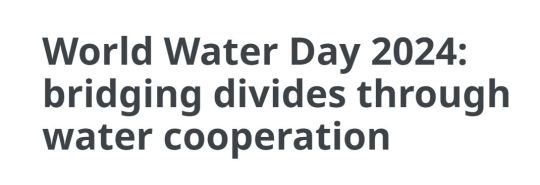
Today, World Water Day 2024 calls us to action, to unite around the theme of "Water for Peace" and to leverage water as a tool for building a more stable, peaceful world.
Access to drinking-water is a human right, but when water is scarce or polluted, or when people have unequal or no access, tensions can rise (1). This underscores the need to harness the cooperative power of water.
Successful examples of water cooperation highlight its value in conflict resolution and community improvement. In Yemen, water user associations have worked to better manage water resources, reduce disputes and empower women. Meanwhile, river basin organizations in Senegal and elsewhere are praised for strengthening livelihoods, development and peace.
“Water bridges the gap between peace and prosperity,” said Dr Maria Neira, Director, Department of Environment, Climate Change and Health. “On this World Water Day, let's harness its power to foster global harmony and health. Safe water and sanitation are not just life-savers; they're peacemakers in our quest for a healthier, more peaceful world.”
Published today, the United Nations world water development report 2024 presents the ever-increasing evidence of how water can truly underpin prosperity and serve as an instrument of peace. The report notes that rivers, tributaries, lakes and aquifers know no borders. For this reason, over the years, water management has more often been a source of cooperation than one of confrontation.
Cooperation is necessary to harness water as a means of building peace and security. At the local and national level, different water users – particularly water and sanitation utilities, energy, food and industry – must cooperate through an integrated water resources management approach. The health sector can further integrate water, sanitation and hygiene-based guidance. Internationally, countries should form agreements and institutions for peaceful transboundary water management, including adhering to conventions like the United Nations Water and Watercourses Convention.
Cooperation not only paves the way for peace but also propels progress toward the Sustainable Development Goals. By prioritizing cooperation and sustainable management of water resources, the world can transform water from a potential source of conflict into a catalyst for peace, stability and prosperity, even amid challenges like climate change, mass migration and political unrest.

#sdg6#water resources#world water day#water availability#world health organization#fresh water resources#water shortage#safe drinking water#unsafe water#unsafe hygiene#unsafe sanitation#leveraging water for peace#water for health#water for peace#22 march
1 note
·
View note
Text
Masterclass: Water Resilience.

Water is life. This is not only the slogan used by indigenous tribes protecting their sacred lands. Water is actually life, as we wouldn't have life on Earth without this precious substance. We know of many systems breaking down and the urgency to protect and restore ecosystems and communities. But unlike soil (which can be "made" with the correct elements), water cannot be made: which is why it is our #1 priority as Earth restorers and change makers to pay attention to how it works, how is it sourced, stored, distributed and consumed. In this amazing webinar with one of the leading perma-culturists in Europe, Aline van Moerbeke will take us through the journey of the water cycle and how we each can contribute at the personal and community level to honor and care for this magical element that forms the base of all life on Earth. Join us for an hour full of facts and useful information, bring your questions and concerns. Join us to celebrate and learn more about water on World Water Day.
youtube
#Water is life#gaia education#water resources#water#webinars#22 march#Masterclass#Water Resilience#Youtube
0 notes
Text
Get involved in Providing clean water in Palestine.
This year on 22 March, the United Nations marks World Water Day, under the theme: leveraging water for peace.
0 notes
Text
Showcase water's pivotal role in fostering peace, prosperity, and conflict prevention.
Under the theme “Water for Peace”, this campaign, led jointly by UNESCO and UNECE on behalf of UN-Water, showcases water's pivotal role in fostering peace, prosperity, and conflict prevention.
Join us at UNESCO Headquarters for the official World Water Day 2024 celebration. This pivotal event promises a rich one-day programme filled with insights from distinguished speakers, including heads of UN agencies and high-level officials, alongside technical presentations that draw on field experiences. The day will also be enlivened by artistic and cultural activities that echo the theme. A highlight of the celebration will be the unveiling of the United Nations World Water Development Report 2024.
Programme highlights
High level Opening Ceremony
Launch of the United Nations World Water Development Report 2024
Technical Discussions on Water Cooperation and Peacebuilding
Cultural shows and indoor photo exhibition (Walk of Water)
Provisional event programme:
English | Français
UN World Water Development Report 2024

The UN World Water Development Report (WWDR) is published by UNESCO, on behalf of UN-Water and its production is coordinated by the UNESCO World Water Assessment Programme. Since its first edition in 2003, the series provide policy and decision-makers with factual evidence and tools to stimulate ideas and actions. This comprehensive report, funded by the Italian Government, also provides an authoritative overview of global water trends, challenges, and solutions. The 2024 Report, entitled "Water for Prosperity and Peace", underlines the interlinked complex relationships between water, prosperity and peace, describing how progress in one dimension can have positive repercussions on the others.
Ensure your participation in the dialogue on sustainable water management and peace by exploring the findings and recommendations of the UN WWDR 2024.
Participate in the celebration.
We welcome the participation of members of governments, international organizations, NGOs, academia, the private sector, and all stakeholders interested in the sustainable management of water resources and the promotion of peace; in-person or by watching live. Registration is mandatory to participate in-person.
Register to participate in person
#2024 World Water Development Report#Water for Prosperity and Peace#unesco#world water day#22march#Events
0 notes
Text
We all need to unite around water and use water for peace, laying the foundations of a more stable and prosperous tomorrow.

FORUM: "Leveraging Water for Peace." World Water Day 2024. Water can create peace or spark conflict. When water is scarce or polluted, or when people have unequal, or no access, tensions can rise between communities and countries. More than 3 billion people worldwide depend on water that crosses national borders. Yet, only 24 countries have cooperation agreements for all their shared water. As climate change impacts increase, and populations grow, there is an urgent need, within and between countries, to unite around protecting and conserving our most precious resource. Public health and prosperity, food and energy systems, economic productivity and environmental integrity all rely on a well-functioning and equitably managed water cycle. When we cooperate on water, we create a positive ripple effect – fostering harmony, generating prosperity and building resilience to shared challenges. We must act upon the realization that water is not only a resource to be used and competed over – it is a human right, intrinsic to every aspect of life. This World Water Day, we all need to unite around water and use water for peace, laying the foundations of a more stable and prosperous tomorrow. Follow the conversation with the hashtags: #WorldWaterDay, #22March., #Acceleratingchange.
EVENTS: On March 22nd at UNHQ in New York; The celebration of the World Water Day 2024 and the launch of the World Water Development Report 2024. under the auspice of the UNESCO entitled :"Water for prosperity and peace" will be held. During the event, Panelists and participants will talk about working together to balance everyone’s needs, with a dedication to ensure no one is left behind, to make water a catalyst for a more peaceful world.
Key messages:
Water can create peace or spark conflict. When water is scarce or polluted, or when people struggle for access, tensions can rise. By cooperating on water, we can balance everyone’s water needs and help stabilize the world.
Prosperity and peace rely on water. As nations manage climate change, mass migration and political unrest, they must put water cooperation at the heart of their plans.
Water can lead us out of crisis. We can foster harmony between communities and countries by uniting around the fair and sustainable use of water – from United Nations conventions at the international level, to actions at the local level.
#water resources#sdg6#leveraging water for peace#united nations#world water day#water stewardship#water conflicts#water cooperation
0 notes
Text
2nd session, 14th Meeting of the Task Force on Water and Climate.
The fourteenth meeting of the Task Force on Water and Climate aims to discuss, plan and provide guidance to the implementation of the activities on Water diplomacy and Climate change under the programme of work for 2022-2024 of the Water Convention as well as to the planned activities under the next programme of work for 2025-2027 of the Water Convention. UN Web TV
Watch the 2nd session, 14th Meeting of the Task Force on Water and Climate.
#task force#Task Force on Water and Climate#water resources#water management#sdg6#groundwater#water convention#water and climate#climate change#plenary session
8 notes
·
View notes
Text
1st session, 14th Meeting of the Task Force on Water and Climate.
The fourteenth meeting of the Task Force on Water and Climate aims to discuss, plan and provide guidance to the implementation of the activities on water and climate under the programme of work for 2022-2024 of the Water Convention as well as to the planned activities under the next programme of work for 2025-2027 of the Water Convention.
Watch 1st session, 14th Meeting of the Task Force on Water and Climate!
0 notes
Text
Shaping our water future.

Registration is open for the #WorldWaterCongress & Exhibition in Toronto! Super early bird discount available until 3 March 2024.
0 notes
Text
Thematic Report to the 79th session of the United Nations General Assembly “Water and food nexus: a human rights approach to water management in food systems”.
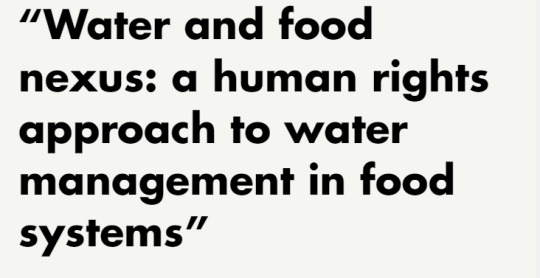
The Special Rapporteur on the human rights to safe drinking water and sanitation, Pedro Arrojo Agudo, is inviting inputs from States and other stakeholders to inform his thematic report on “Water and food nexus: a human rights approach to water management in food systems”. The report will be presented at the United Nations General Assembly's 79th session in October 2024.
The Special Rapporteur on the human rights to safe drinking water and sanitation understands that the dominant systems of large-scale food production and comercialication are harming the human rights to safe drinking water and sanitation worldwide. For the Special Rapporteur, under the argument of producing more and more food for a growing world population, the right to food is often used as an argument to justify unsustainable water management, overusing water sources and affecting aquatic systems, resulting in contamination or scarcity of water needed for human use. As reflected in Special Rapporteur´s report A/HRC/54/32 of 2023, guaranteeing the human right to water for the most impoverished requires restoring the good state of the aquatic ecosystems on which they depend for their water supply. In addition, over-exploitation and pollution of aquatic ecosystems often undermine small-scale food production for self-consumption in impoverished rural communities.
In this connection, the Special Rapporteur would like to call member states, non-state actors, civil society, academia, indigenous peoples, individuals, and other relevant stakeholders to send their contributions and experiences related to the sustainability of aquatic ecosystems and freshwater sources and the systems used to produced food. The Special Rapporteur would appreciate receiving inputs on the interlinkages between both rights and the positive and negative experiences on sustainable (or unsustainable) use of water sources by food systems, including court rulings at global, regional, national, and local levels.
The Special Rapporteur wishes to thank States, indigenous peoples, civil society organisations, academic institutions, businesses, international organisations, individuals, and other stakeholders for their continued engagement with this mandate.
Key information sought: To facilitate the reception of inputs, the Special Rapporteur prepared a list of key information which he considers essential for the report. The list could be answered entirely or partially according to the expertise and experience of those actors willing to contribute to the Report. List of topics: English | Français | Español
How inputs will be used
All submissions will be published on the website of the mandate. Non-state actors could request the confidentiality of the submission.
Next Steps
Please send your contributions via email, indicating “Input Water and Food Nexus” in the email subject line. Your contribution should be sent by no later than 15 March 2024
Email address: [email protected] AND to [email protected].
Email subject line: Input water and food nexus
Word limit: 2500 words
File formats: Word, PDF
Accepted languages: English, Spanish, French
#Special Rapporteur on the rights to water and sanitation#sdg6#water resources#water governance#human rights approach#call for imputs#safe drinking water#OHCHR#Water and Food Nexus#UNGA79#water management#water goals#member states#non-state actors#civil society#academia#indigenous peoples#individuals#stakeholders
16 notes
·
View notes
Text
Voices from the field: source-to-sea stories from around the world.
This session explores key lessons learned from applying source-to-sea management in a variety of contexts around the world and aims to highlight next step in developing this innovative approach.
Source-to-sea is a highly promising holistic management approach since it highlights the upstream and downstream linkages between actions on land (e.g., urban development, agriculture and forestry) and across freshwater, coastal, and marine ecosystems. Through fostering participation and collaboration between stakeholders, it seeks to prioritize actions that hold the greatest potential for positive impacts across the whole system.
On Sunday, 20 August 2023; From 16:00-17:30 hrs; A panel discussion entitled'' Voices from the field: source-to-sea stories from around the world .'' was held.
See the full programme.
#wwweek#water governance#water#fresh water resources#integrated water resources management#water reservoir#water resources management#panel discussion#unep
0 notes
Text
Scaling Up Solutions for Sustainable Wastewater and Nutrient Management: Nutrient Recovery from Wastewater.
On Wednesday, 23 August, 2023. From 09:30-10:00 hrs a panel discussion entitled ''Scaling Up Solutions for Sustainable Wastewater and Nutrient Management: Nutrient Recovery from Wastewater." will be held.
0 notes